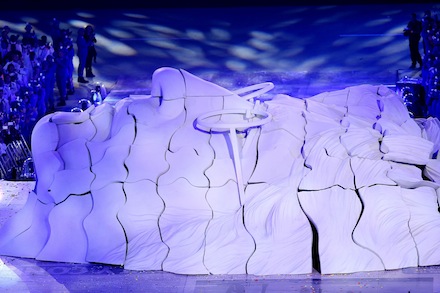John Lennon’s Imagine encapsulates so many modern objections to religion

Last
night, watching the Olympic closing ceremony, like millions of others ,
I heard a digitally remastered John Lennon singing Imagine. The song
was familiar, but the words took me by surprise. These words
encapsulate so many of the modern objections to religion and faith, that
it seems a good idea to present a few counter-arguments.
To “live for today” is precisely what we all do, all of us, believers and not. Christians do not neglect present exigencies just because they believe there is a afterlife. Rather, the call of eternal life makes this world more, not less important. To claim that Christians do not care about today, so wrapped up are they in what is to come, is to confuse Christianity with millenarian cultists, which is what we are not.
Heaven and hell, by the way, are not places – they are states. Heaven is the state of seeing the Beatific vision; hell is the state of being utterly cut off from God. The idea of these being places either above or below us is persistent, and has its roots in Classical literature, but is certainly not taught by the Church.
Again, the nation-state may well engage in war with other states, but it is important to realise that the nation exists to defend and protect its citizens. Anarchy, in the classical meaning of the word, is envisioned as some sort of utopia, but in practice, where the state withers away, anarchy of the most non-benign type succeeds. Look at Somalia today. Look at Lebanon in the time of its civil war. Look at England under King Stephen. The withering away of the state does not lead to peace – but the complete opposite.
As for religion withering away and leading to peace – have a look at some of the avowedly atheist states of the twentieth century: Albania, the People’s Republic of China, and the Soviet Union. No rational person would ever choose to live in such a society.
What about “no possessions”, then? Property is theft? “No need for greed and hunger”? Is this really saying that all poverty and hunger is caused by people selfishly hoarding the world’s resources? Funnily enough it is at this point that John Lennon says something that Catholics may recognise. The Church teaches:
As for the brotherhood of man, that is a Christian idea, but as my old RE teacher told me, it is only possible under the Fatherhood of God. Generally speaking, when people imagine there is no heaven and no hell, and no God, they start doing the most beastly things to each other, and creating not Utopia, but Hell on earth.
To “live for today” is precisely what we all do, all of us, believers and not. Christians do not neglect present exigencies just because they believe there is a afterlife. Rather, the call of eternal life makes this world more, not less important. To claim that Christians do not care about today, so wrapped up are they in what is to come, is to confuse Christianity with millenarian cultists, which is what we are not.
Heaven and hell, by the way, are not places – they are states. Heaven is the state of seeing the Beatific vision; hell is the state of being utterly cut off from God. The idea of these being places either above or below us is persistent, and has its roots in Classical literature, but is certainly not taught by the Church.
Again, the nation-state may well engage in war with other states, but it is important to realise that the nation exists to defend and protect its citizens. Anarchy, in the classical meaning of the word, is envisioned as some sort of utopia, but in practice, where the state withers away, anarchy of the most non-benign type succeeds. Look at Somalia today. Look at Lebanon in the time of its civil war. Look at England under King Stephen. The withering away of the state does not lead to peace – but the complete opposite.
As for religion withering away and leading to peace – have a look at some of the avowedly atheist states of the twentieth century: Albania, the People’s Republic of China, and the Soviet Union. No rational person would ever choose to live in such a society.
What about “no possessions”, then? Property is theft? “No need for greed and hunger”? Is this really saying that all poverty and hunger is caused by people selfishly hoarding the world’s resources? Funnily enough it is at this point that John Lennon says something that Catholics may recognise. The Church teaches:
In the beginning God entrusted the earth and its resources to the common stewardship of mankind to take care of them, master them by labour, and enjoy their fruits. The goods of creation are destined for the whole human race. However, the earth is divided up among men to assure the security of their lives, endangered by poverty and threatened by violence. The appropriation of property is legitimate for guaranteeing the freedom and dignity of persons and for helping each of them to meet his basic needs and the needs of those in his charge. It should allow for a natural solidarity to develop between men.So, Lennon is onto something here, though he is wrong to see property as creating hunger, when ownership of property should in fact guarantee a minimum of prosperity – and in fact the greatest famines of the twentieth century were caused by collectivisation in the Soviet Union and China.
As for the brotherhood of man, that is a Christian idea, but as my old RE teacher told me, it is only possible under the Fatherhood of God. Generally speaking, when people imagine there is no heaven and no hell, and no God, they start doing the most beastly things to each other, and creating not Utopia, but Hell on earth.


Comments
Post a Comment